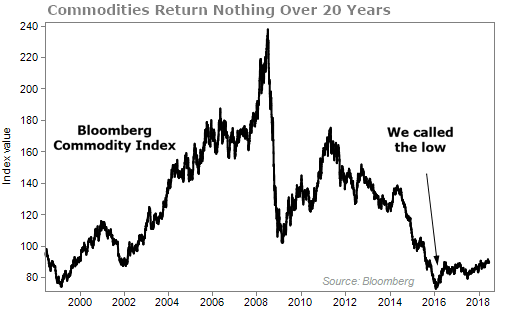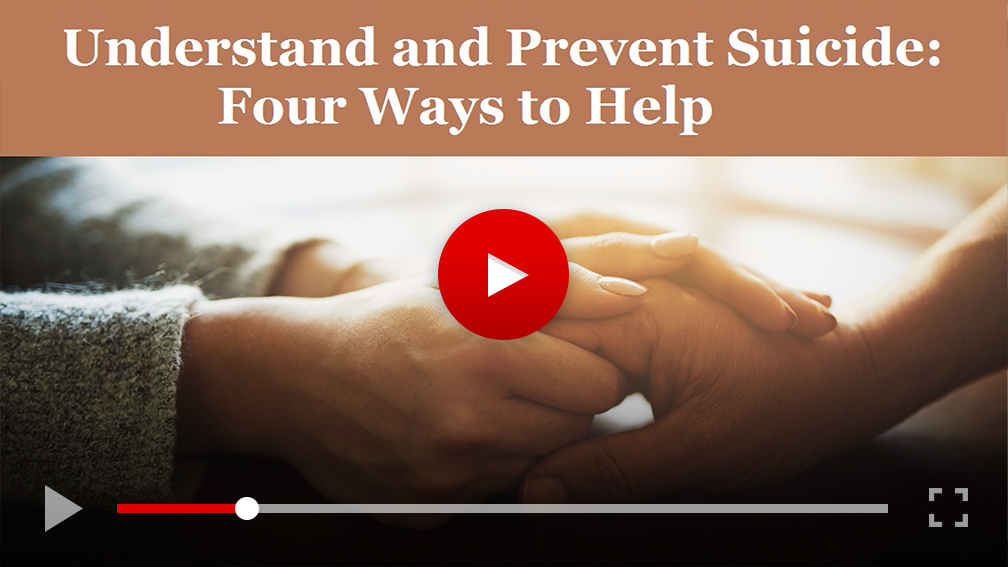If you've been a long-term, buy-and-hold commodity investor for 20 years, you may not have earned a dime.
Yet... in that period, you could have made thousands of percent gains if you could have correctly traded the commodity cycle.
According to the Bloomberg Commodity Index – which includes gold, crude oil, copper, corn, and other commodities – the prices of these so-called "real" assets are down over a stretch of two decades. That's despite official inflation numbers climbing 54% over the same time period.

In my monthly income-focused newsletter, Income Intelligence, we've largely avoided commodities (except for oil) since launching in 2013. But in early 2017, we called the low...
But today, the story is changing... and quickly. Commodities are cyclical assets, meaning they regularly go through boom and bust cycles. Today, commodities look too cheap and the sector – again, aside from oil – has seen a decade of underinvestment.
If you've been waiting to get into commodities, now is the time.
The risk is that the value of commodities can change quickly. Take the collapse of gold in 1980, when it fell 40% in just two months.
So what's the best way to invest in commodities... and which commodities should you buy now?
That's where my friend and colleague Dr. Steve Sjuggerud comes in...
If you missed out on the big real estate, bond, and stock market gains in recent years... don't worry. According to Steve, there's a looming bull market in commodities that will give you a chance to invest, and potentially more than double your money in the coming years.
On Thursday, June 21 at 8 p.m. Eastern time, Steve will explain why commodities are set to move much higher right now and the best way to make these investments.
Steve will also reveal one of his favorite commodity investments... but you have to attend the event to find out more.
Click here to reserve your spot.
Q: [Regarding] "Real Men Don't Drink Soy." What about fermented soy products? Are they as harmful as regular soy products? – T.W.
A: We wrote about phytoestrogens in soy... these are plant-based forms of estrogen. In excessive quantities, men suffer from too much estrogen. But women benefit from moderate consumption, with benefits to their bone health and more. And it's due to these phytoestrogens.
Now, we did find a study in Food Microbiology where researchers looked at fermented soy products. Overall, fermented soy had lower levels of total phytoestrogens. However, the two types we mentioned in our article, genistein and daidzein, actually increased with fermentation. Each type more than doubled after fermentation. But the good news for women: the type of plant estrogen responsible for bone health increased with fermentation.
So keep enjoying some soy, but don't go overboard. And enjoy other fermented foods like kimchi and yogurt for plenty of probiotic benefits.
Q: I would like to know if there is a way to access all closed end funds. – G.U.
A: You can discover a lot of information about different funds, like if a fund is trading at a discount to its net asset value (or "NAV"), by going to the website CEFConnect.com. It's easy to use... Simply type the fund's ticker symbol into the search box. That will direct you to the fund's main page. You'll find the current NAV (and whether the stock is trading at a discount or premium to its NAV) near the top of the page, under the fund's name. You can also find out the fund's top holdings, fees, and asset allocation.
Q: Doc, you talk a lot about different "epidemics" in the U.S., but what are your thoughts on this suicide crisis? I've seen a lot of articles about how much suicide rates are up. – L.S.
A: Many of you have probably seen the recent reports that show suicide rates are rising in the U.S., up 25% since 1999. What's more, one in five Americans will suffer from a mental health problem this year. It's time to break the stigma surrounding mental health, especially depression. That's why this week, I had my research writer Amanda Cuocci share some important lessons and resources to help you understand and prevent suicide.
Click below to watch.
Happy Father's Day from the Health & Wealth Bulletin team. What's the best advice your father gave you? Share it with us at [email protected].
[optin_form id="73"]
What We're Reading...
- Did you miss it? It's time to discuss this taboo topic.
- Something different: The surprising history of Father's Day.
Here's to our health, wealth, and a great retirement,
Dr. David Eifrig and the Health & Wealth Bulletin Research Team
Baltimore, Maryland
June 15, 2018

